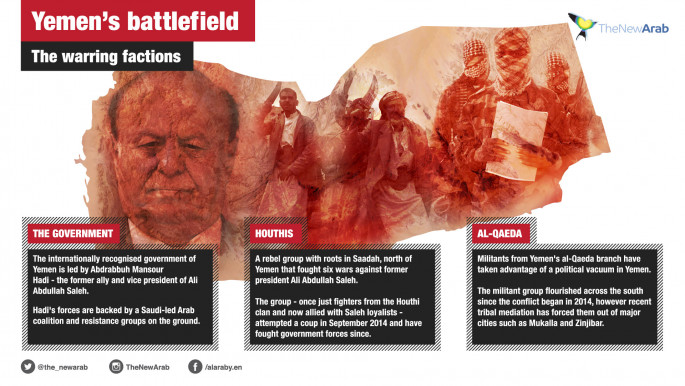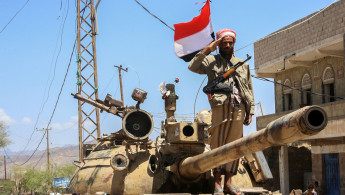No let-up in Yemen: Warring factions violate truce
As the three-day truce officially comes to an end on Friday, Yemen's warring factions continue to accuse each other of breaching the UN-sponsored ceasefire.
2 min read
The conflict has raged between Houthi rebels and pro-government Arab coalition for 2 years [AFP]
Yemen's warring factions continued fighting throughout the course of a three-day ceasefire, mulitple witnesses have said, accusing both Houthi rebels and the Saudi-led coalition of breaching the truce.
Fighter jets from the Saudi-led coalition hit rebel positions outside the Yemeni capital, Sanaa, witnesses said on Friday, after the alliance accused the insurgents of breaching the ceasefire in other parts of the country.
The airstrikes targeted rebel positions at Jebel al-Nabishuaib, on the southwestern outskirts of rebel-held Sanaa - an area that hosts bases for air defences controlled by renegade troops loyal to former president and Houthi-ally, Ali Abdullah Saleh.
Air raids also targeted rebels in the northern provinces of Jawf and Saada, witnesses and rebel media said.
Meanwhile, Yemen's third-largest city, Taiz, was bombarded by Houthi shelling - despite the supposed truce.
Major-General Ahmed Assiri, the coalition spokesman, told AFP, was "no ceasefire at all", because of repeated rebel breaches.
"This is the same situation as the previous time when we called for a ceasefire," Assiri said.
Saudi Foreign Minister Adel al-Jubeir said rebels were stepping up their attacks.
"As of this morning Washington time there had been more than 150 violations by the Houthi-Saleh side," he said, referring to the rebels and forces loyal to the former president.
The truce, for an initial period of three days, took effect just before midnight on Wednesday to allow aid deliveries in Yemen, where the war has killed thousands and left millions homeless and hungry.
The Saudi-led Arab coalition intervened in March 2015 to support Hadi's government after the Houthis overran much of the impoverished country on the southern tip of the Arabian Peninsula.
Five previous truce attempts failed - but cautious optimism preceded the current pause after intensified international pressure following an escalation in fighting.
The ceasefire was announced after an attack on a funeral ceremony killed more than 140 mourners, triggering global outrage and prompting the United States to review its support of the military campaign in Yemen.
More than 10,000 people have been killed - more than half of them civilians - while another three million are displaced and some 70 percent of the population needs desperate food aid.
Fighter jets from the Saudi-led coalition hit rebel positions outside the Yemeni capital, Sanaa, witnesses said on Friday, after the alliance accused the insurgents of breaching the ceasefire in other parts of the country.
The airstrikes targeted rebel positions at Jebel al-Nabishuaib, on the southwestern outskirts of rebel-held Sanaa - an area that hosts bases for air defences controlled by renegade troops loyal to former president and Houthi-ally, Ali Abdullah Saleh.
Air raids also targeted rebels in the northern provinces of Jawf and Saada, witnesses and rebel media said.
Meanwhile, Yemen's third-largest city, Taiz, was bombarded by Houthi shelling - despite the supposed truce.
| Read more: Abducted Australian appeals to government in Yemen hostage video |
Major-General Ahmed Assiri, the coalition spokesman, told AFP, was "no ceasefire at all", because of repeated rebel breaches.
"This is the same situation as the previous time when we called for a ceasefire," Assiri said.
Saudi Foreign Minister Adel al-Jubeir said rebels were stepping up their attacks.
"As of this morning Washington time there had been more than 150 violations by the Houthi-Saleh side," he said, referring to the rebels and forces loyal to the former president.
The truce, for an initial period of three days, took effect just before midnight on Wednesday to allow aid deliveries in Yemen, where the war has killed thousands and left millions homeless and hungry.
The Saudi-led Arab coalition intervened in March 2015 to support Hadi's government after the Houthis overran much of the impoverished country on the southern tip of the Arabian Peninsula.
Five previous truce attempts failed - but cautious optimism preceded the current pause after intensified international pressure following an escalation in fighting.
The ceasefire was announced after an attack on a funeral ceremony killed more than 140 mourners, triggering global outrage and prompting the United States to review its support of the military campaign in Yemen.
More than 10,000 people have been killed - more than half of them civilians - while another three million are displaced and some 70 percent of the population needs desperate food aid.






 Follow the Middle East's top stories in English at The New Arab on Google News
Follow the Middle East's top stories in English at The New Arab on Google News

![Israeli forces ordered bombed Gaza's Jabalia, ordering residents to leave [Getty]](/sites/default/files/styles/image_330x185/public/2176418030.jpeg?h=a5f2f23a&itok=_YGZaP1z)
